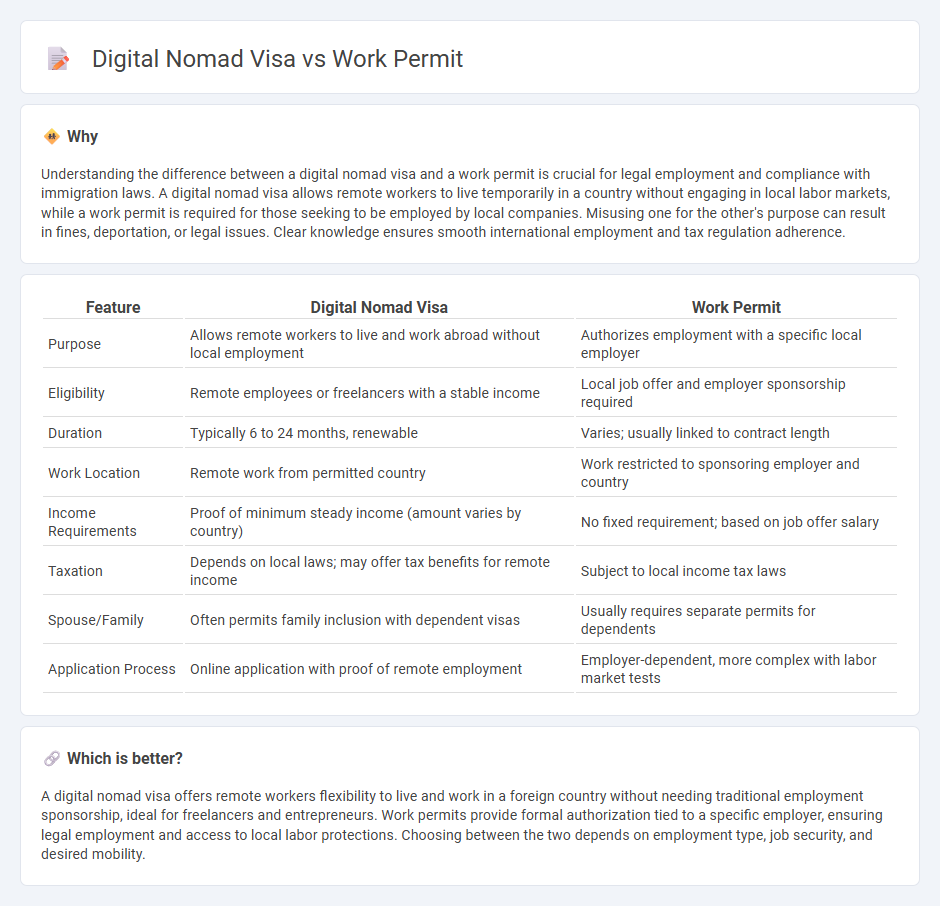
A digital nomad visa offers remote workers the flexibility to live and work in a foreign country without requiring local employment, emphasizing location independence and often simpler application processes. In contrast, a work permit mandates sponsorship by a local employer and is tied to specific job roles and labor market regulations, ensuring compliance with the host country's employment laws. Explore the differences to determine which option best suits your career and lifestyle goals.
Why it is important
Understanding the difference between a digital nomad visa and a work permit is crucial for legal employment and compliance with immigration laws. A digital nomad visa allows remote workers to live temporarily in a country without engaging in local labor markets, while a work permit is required for those seeking to be employed by local companies. Misusing one for the other's purpose can result in fines, deportation, or legal issues. Clear knowledge ensures smooth international employment and tax regulation adherence.
Comparison Table
| Feature | Digital Nomad Visa | Work Permit |
|---|---|---|
| Purpose | Allows remote workers to live and work abroad without local employment | Authorizes employment with a specific local employer |
| Eligibility | Remote employees or freelancers with a stable income | Local job offer and employer sponsorship required |
| Duration | Typically 6 to 24 months, renewable | Varies; usually linked to contract length |
| Work Location | Remote work from permitted country | Work restricted to sponsoring employer and country |
| Income Requirements | Proof of minimum steady income (amount varies by country) | No fixed requirement; based on job offer salary |
| Taxation | Depends on local laws; may offer tax benefits for remote income | Subject to local income tax laws |
| Spouse/Family | Often permits family inclusion with dependent visas | Usually requires separate permits for dependents |
| Application Process | Online application with proof of remote employment | Employer-dependent, more complex with labor market tests |
Which is better?
A digital nomad visa offers remote workers flexibility to live and work in a foreign country without needing traditional employment sponsorship, ideal for freelancers and entrepreneurs. Work permits provide formal authorization tied to a specific employer, ensuring legal employment and access to local labor protections. Choosing between the two depends on employment type, job security, and desired mobility.
Connection
Digital nomad visas and work permits both serve to legally authorize individuals to work remotely in foreign countries, enabling employment opportunities beyond their home nation. Digital nomad visas typically streamline the process for remote workers by combining residence and work authorization without requiring traditional local employment contracts. Work permits, on the other hand, are more rigid, often linked to specific employers and job roles, highlighting the distinct but complementary roles each plays in facilitating cross-border employment.
Key Terms
Legal Authorization
A work permit legally authorizes foreign nationals to engage in employment within a specific country, often requiring sponsorship by an employer and adherence to local labor laws. In contrast, a digital nomad visa grants legal permission to reside and work remotely without local employment, targeting freelancers and remote workers who operate internationally. Explore the key distinctions and application processes to determine the best fit for your lifestyle and career goals.
Remote Work
A work permit typically requires employer sponsorship and restricts employment to a specific company within the issuing country, while a digital nomad visa allows remote workers to legally reside and work from a country without local employment ties. Digital nomad visas are designed for location-independent professionals, offering greater flexibility and shorter application processes compared to traditional work permits. Explore the advantages and requirements of each option to determine the best fit for your remote work lifestyle.
Residency Rights
Work permits grant foreign nationals the legal right to reside and work in a host country, typically tied to a specific employer and subject to local labor laws. Digital nomad visas offer temporary residency for remote workers without requiring local employment, allowing more flexibility but often with limited access to social benefits and long-term residency rights. Explore detailed comparisons to understand which option best suits your lifestyle and professional goals.
Source and External Links
LEO - Work Permit Information - Minors under 18 require a work permit before starting work in Michigan, which must be completed by the minor, employer, and a school official, and may be revoked for poor academic performance.
Work in the U.S. with a work permit (EAD) - Nonimmigrant visa holders in the U.S. may need a work permit (Employment Authorization Document) by filing Form I-765 to legally work for most employers temporarily.
Employment of Minors (Work Permit) - Maryland - All minors under 18 must have a work permit to work in Maryland, except those under 14 except special cases, and the permit must be applied for online and signed by the minor, parent/guardian, and employer.
 dowidth.com
dowidth.com